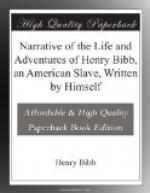I have long thought from what has fallen under my own observation while a slave, that the strongest reason why southerners stick with such tenacity to their “peculiar institution,” is because licentious white men could not carry out their wicked purposes among the defenceless colored population as they now do, without being exposed and punished by law, if slavery was abolished. Female virtue could not be trampled under foot with impunity, and marriage among the people of color kept in utter obscurity.
On the other hand, lest it should be said by slaveholders and their apologists, that I have not done them the justice to give a sketch of the best side of slavery, if there can be any best side to it; therefore in conclusion, they may have the benefit of the following case, that fell under the observation of the writer. And I challenge America to show a milder state of slavery than this. I once knew a Methodist in the state of Ky., by the name of Young, who was the owner of a large number of slaves, many of whom belonged to the same church with their master. They worshipped together in the same church.
Mr. Young never was known to flog one of his slaves or sell one. He fed and clothed them well, and never over-worked them. He allowed each family a small house to themselves with a little garden spot, whereon to raise their own vegetables; and a part of the day on Saturdays was allowed them to cultivate it.
In process of time he became deeply involved in debt by endorsing notes, and his property was all advertised to be sold by the sheriff at public auction. It consisted in slaves, many of whom were his brothers and sisters in the church.
On the day of sale there were slave traders and speculators on the ground to buy. The slaves were offered on the auction block one after another, until they were all sold before their old master’s face. The first man offered on the block was an old gray-headed slave by the name of Richard. His wife followed him up to the block, and when they had bid him up to seventy or eighty dollars one of the bidders asked Mr. Young what he could do, as he looked very old and infirm? Mr. Young replied by saying, “he is not able to accomplish much manual labor, from his extreme age and hard labor in early life. Yet I would rather have him than many of those who are young and vigorous; who are able to perform twice as much labor—because I know him to be faithful and trustworthy, a Christian in good standing in my church. I can trust him anywhere with confidence. He has toiled many long years on my plantation and I have always found him faithful.”
This giving him a good Christian character caused them to run him up to near two hundred dollars. His poor old companion stood by weeping and pleading that they might not be separated. But the marriage relation was soon dissolved by the sale, and they were separated never to meet again.




